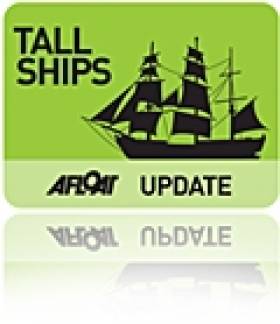Displaying items by tag: Maylis de Kerangal
Alliance Franҫcaise de Cork and Fondation Belém in association with the Port of Cork are pleased to announce arrival of the French tall-ship fleet, Belém, a 116-year old barque at one stage owned by the Guinness family, writes Jehan Ashmore.
During her four-day stay the pride of the French tall-ship fleet is to berth at Albert Quay, in the heart of Cork city-centre where the public can thread her timber decks on Saturday (2 July) between 11.30-17.00 hours and on Sunday (3 July) starting from 10.00 till 18.00 hours. There is an admission of €5 for adults, a concession of €3 and a family ticket costs €10.
Visitors can trace her long and varied career with an exhibit housed below decks of the historic vessel which was built in 1896 in Nantes. For nearly two decades she crossed the Atlantic transporting a diverse cargo but mostly spices, sugar and cocoa beans from her namesake port of Belém do Pará, on the north-east coast of Brazil bound for France. She would sail upriver on the River Seine to supply the cocoa beans for a Paris-based chocolate-maker.
Belem would later become under the British flag and she became the property of the Duke of Westminster, who converted her to a luxury pleasure yacht. In 1921 she was sold to the Hon. Arthur Ernest Guinness, who renamed her Fantôme II and took part in the Cowes regattas and cruised around the world between 1923 and 1924 with his family.
To read more on the vessel's other career's under several owners until her present-day role as a sail-training vessel operated by the Fondation Belém click HERE and also www.portofcork.ie
In addition to visitors boarding the Belem, the public are invited to attend free readings by the Cork poets William Wall and Thomas McCarthy. Accompanying the poets are French writers Maylis de Kerangal and Olivier Sebban for a session of Franco-Irish readings which too takes place on the Saturday evening between 18.00 -19.30 hours.
For further information contact Vytenė Laučytė, Cultural Coordinator, Alliance Franҫaise de Cork Tel: (021) 431 0677 or by email: [email protected]
All advance bookings for the visit on board the Belem are to be made at Alliance Franҫaise de Cork. Tickets are also available at the entrance to the tallship alongside Albert Quay, Cork. Last year Alliance Francaise celebrated its 50th anniversary
- Cork Harbour
- port of Cork
- Brazil
- Alliance Française
- Cork Harbour News
- Paris
- Belem
- Arthur Ernest Guinness
- Cocoa
- TallShips
- Albert Quay Cork
- Fondation Belem
- Tall Ships news
- Duke of Westminster
- Guinness
- Paris chocolate makers
- Fantome II
- William Wall
- Thomas McCarthy
- Cork poets
- French writers
- Maylis de Kerangal
- Olivier Sebban






























































